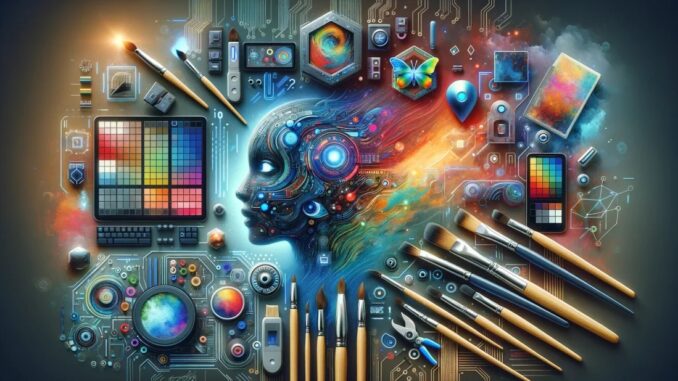
By Emmad Kashmiri and Kate Dempsey
“Is AI-generated art actually art? Should we give AI human rights once it becomes sentient?” The Computer Science Club, in conjunction with the Anime Club, organized “A Study of the Soul of AI” to answer these questions and more on March 26.
To organizers, the goal of hosting the event was to engage in the larger conversations around AI, as well as its impact on the anime industry. In our homes, workplaces, and almost every facet of our lives, the benefits of AI’s omnipresence in society is still subject to debate.
“We are all having that dichotomy where it’s like, ‘Is AI bad?’ ‘Is AI good?’ ‘Should it write my essays?’ […] It’s like what are we going to do now because everything is chaotic now that we have a new form of developing people in a sense,” Gianni Cooper, president of the Anime Club, told The Vanguard.
The concerns are particularly relevant for artists, whose work may be under threat by AI generators. An AI generator can be programmed to create the art, but its source material may lead to plagiarism of existing art.
“It’s a very vivid nightmare that’s very much in your face because before anything one of the worst things about what AI has become nowadays isn’t that it’s able to do the work for you, that’s not the intrinsic problem,” said Cooper. “The problem is that it’s doing the art for you and AI can’t create art without a substance to base it off, one of the many factors being they copy off of people.”
As AI technology evolves, animators are finding it a challenge to compete with AI-generated content, on top of the normal pressures of making it in the industry. The algorithms within AI are able to rapidly generate animation sequences, posing a threat to traditional animators who often labor for hours to bring characters to life frame by frame.
“We all remember when AI first came out, it couldn’t draw hands. What’s the first thing that a lot of people struggle with when it comes down to art? Hands,” Cooper said. “When we get to that point where they are able to animate stuff even more complex than hands, you’re going to have multiple showings of people’s art getting stolen from.”
Despite the popularity and global appeal of anime, many animators endure harsh working conditions and long hours just to meet demanding production schedules. The pressure to churn out content quickly often results in burnout and exploitation, with animators sacrificing their well-being for the sake of their product.
“A lot of the anime industry is akin to like sweatshops: they do not respect people when they go into that industry you are basically working day in day out. It’s very rough on the body and the soul, ” said Cooper. “AI has taken the world by storm, and companies naturally want to save as much money as possible, so the two mixing would be disastrous for the animation industry.”
AI can have major implications for musicians in the anime industry as well. Much like graphics that AI could copy from artists, AI could learn and recreate music made by musicians and declare it as being original.
“Besides the animation part, a lot of the studio music that’s developed in anime also uses a lot of artificial programs and that could just make either songwriters that produced that type of art and that genre obsolete,” said Angellide Leon, vice-president of the Anime Club.
At the event, club leaders used anime itself to illustrate the potential harm that AI could have if used in real life. This included scenes from “Psycho-Pass,” a sci-fi dystopian anime where their AI weapons determine for them if someone should be killed or saved, often leading to moral ambiguity if it was warranted to do so.
While AI has the potential to revolutionize industries and improve lives, it raises important questions about ethics, fairness, and the future of work and wages.
“We are all very concerned we are not going to have jobs. […] It’s hard to avoid artificial intelligence. Though there is a lot of reluctance to adapt it by large companies, AI is very much on the mind of a lot of programmers and a lot of tech professionals,” Diana Hung, president of the Computer Science Club, told The Vanguard. “I think it’s important that we kind of have these discussions and also talk about whether or not AI might be ethical, because feeding and training artificial intelligence is very labor-intensive.”
While AI’s takeover of the labor market remains in the air, programmers continue to be concerned with its role in replacing humans. As AI is increasingly integrated into society, it remains to be seen whether or not it will one day be considered a member of society itself.
“In the event that this AI becomes so trained that it can replace a person, or act in a mode just like a person, do we need to give it human rights? Those are questions we are all asking,” said Hung. “Are we willing ourselves into becoming obsolete?”
